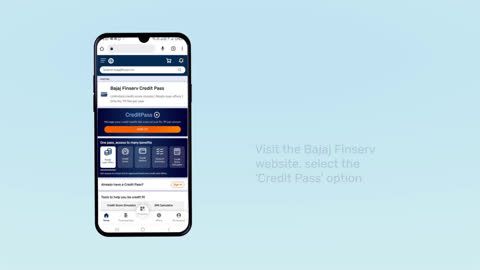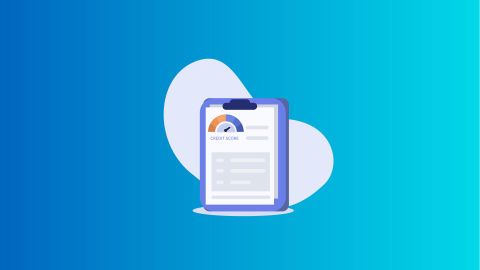A CIBIL score is a crucial financial metric that reflects your creditworthiness. It's a three-digit number that lenders use to assess your credit history and risk profile. Checking your CIBIL score regularly can help you maintain a healthy credit profile and make informed financial decisions. You are eligible for one free credit report per year from CIBIL. Read on to know more about your CIBIL Score and how to check your free CIBIL Score and more.
What is credit score?
A credit score is a numerical representation of an individual's creditworthiness, reflecting their ability to manage debt responsibly.
It's calculated based on information from a credit report, which includes factors like payment history, credit utilisation, types of credit used, length of credit history, and recent credit inquiries. A higher credit score indicates a lower risk to lenders, often leading to better interest rates and loan terms. Maintaining a good credit score is crucial for financial health, as it can impact various aspects of life, including loan approvals, rental applications, and even employment opportunities.
How does credit score works?
1. Personalised offers
Get exclusive pre-approved offers on loans, credit cards, and more based on your credit score.
2. Better negotiating power with lenders
With a high CIBIL Score you have an edge over other borrowers and can negotiate for a better interest rate or a lesser processing fee.
3. Lower interest rates
If you have a high credit score, lenders will provide you with a comparatively lower rate of interest for availing loans or credit cards.
4. Easier loan approval
A high credit score indicates that you are a safe borrower. Lenders are more likely to approve your loan quickly.
5. Higher loan amounts
High loan amounts translate to increased risk for lenders. Hence, they prefer lending to borrowers who have a high CIBIL Score.
6. Longer loan tenures
Borrowers with a good CIBIL Score can benefit from loans with long tenures. This translates to smaller EMIs and reduces their monthly expense burden.
What is the Importance of a CIBIL Score?
Your CIBIL Score serves as a measure of your creditworthiness, assessing your capacity to repay borrowed amounts. It ranges from 300 to 900 and is provided by the company TransUnion CIBIL. Aim for a high score as a higher score makes you a more reliable applicant when applying for loans or credit cards. Conversely, a low score suggests a history of not making timely payments. Work on improving your CIBIL Score as a low score makes you appear less responsible as a loan applicant.
Here's a table presenting the CreditVision (CV) score ranges provided by CIBIL:
CreditVision (CV) Score Range |
Description |
Meaning |
300-680 |
Subprime |
This represents the lowest CIBIL Score range. A score in this range indicates a history of delayed credit card bill payments or loan EMIs. Individuals in this range are at a high risk of becoming defaulters. |
681-730 |
Near Prime |
This CIBIL Score range suggests struggles in meeting payment deadlines. While not as critical as the lower range, it still reflects a challenge in timely repayment. |
731-770 |
Prime |
A CIBIL Score within this range indicates good credit behaviour, increasing the likelihood of credit card or loan approval. However, obtaining the most favourable interest rates might still be a challenge. |
771-790 |
Prime Plus |
CIBIL Scores above 771 are considered great, showcasing consistent and timely payment history. Individuals in this range are at the lowest risk of default. |
791-900 |
Super Prime |
CIBIL Scores above 791 are considered excellent. A score in this range makes it easier to secure loans with lower interest rates. Lenders are more likely to approve loan applications from individuals with such high credit scores. |
How to check CIBIL Score for free?
To check your CIBIL score for free, you can follow these simple steps:
- Visit the CIBIL website: Go to the official CIBIL website.
- Register or log in: Create a new account or log in to your existing account.
- Fill out the form: Fill out the form with your details like name, email ID, ID, DOB etc and submit.
- Get your free credit report: Once verified, you will get your free annual credit report on your registered email ID.
What is a good CIBIL Score?
A CIBIL score of 760 or above is generally considered a good credit score by most lenders. Achieving and maintaining a score within this range, ideally closer to 900, significantly enhances loan and credit card approval prospects. It is crucial to monitor credit scores from multiple bureaus as they can vary. Regular credit score checks, at least monthly, are recommended.
Benefits of a good CIBIL Score
A strong credit score is a key factor in loan and credit card applications. It positively influences lender perception of creditworthiness and repayment capacity.
Benefits include:
- Increased loan approval likelihood
- Lower interest rates on loans
- Faster and easier loan and credit card approvals
- Access to pre-approved loan offers
- Higher credit card limits
- Reduced processing fees and other charges
While a significant factor, credit score is not the sole determinant. Lenders also assess income, repayment capacity, debt-to-income ratio, employment history, and profession.
How a CIBIL Score is calculated?
Credit bureaus calculate CIBIL scores based on various factors reflecting past credit behaviour. These factors are reported by banks and NBFCs with each credit application.
5 factors that affect your CIBIL Score
- Loan repayment history: Timely loan and credit card payments significantly impact the score. Defaults and late payments negatively affect it.
- Duration of credit history: A longer credit history with consistent, timely payments demonstrates responsible credit behaviour.
- Number of hard inquiries: Frequent credit applications result in multiple hard inquiries, which can negatively impact the score.
- Credit utilisation: Maintaining a credit utilisation ratio (credit used vs. credit limit) below 30% is generally recommended.
- Credit mix: A diverse credit portfolio (e.g., home loan, personal loan, credit card) demonstrates responsible credit management.
Reasons for a low CIBIL Score
Factors contributing to a low credit score include:
- Missed or late loan and credit card payments
- High credit utilisation ratios (e.g., consistently maxing out credit limits)
- Errors in the credit report
- Excessive hard inquiries
- Closing oldest credit accounts prematurely
- Settling accounts instead of full repayment
How to improve CIBIL Score?
Strategies for improving a low credit score include:
- Consistent and timely payment of all credit obligations
- Reducing credit utilisation
- Correcting errors in the credit report
- Limiting new credit applications
- Maintaining older credit accounts
- Diversifying credit portfolio
- Seeking professional credit advisory services.
What information CIBIL Scores do not consider?
CIBIL scores primarily assess credit history. They generally do not consider factors like:
- Income: Your salary or earning potential is not directly factored in.
- Savings: The amount of money you have in savings accounts is not considered.
- Employment status: While past employment history can indirectly impact credit history, current employment status itself is not a direct factor.
- Education: Your educational background is not directly assessed in the scoring model.
- Lifestyle: Your personal habits or lifestyle choices are not considered in the scoring calculation.
Why there are different CIBIL Scores?
Multiple CIBIL scores may exist for an individual due to variations in the scoring models used by different lenders and credit bureaus. These variations can arise from:
- Different scoring models: Lenders and credit bureaus may utilize different scoring models to assess credit risk, leading to variations in scores.
- Data sources: The specific data used for scoring may differ slightly between models, impacting the final score.
- Focus on specific credit types: Some scores may focus more heavily on specific types of credit, such as mortgage loans or auto loans.
What to do if you do not have a CIBIL Score
If you have limited or no credit history, you may not have a CIBIL score. To establish credit:
- Obtain secured credit: Apply for a secured credit card, requiring a security deposit.
- Become an authorised user: Ask a family member or friend with good credit to add you as an authorized user on their credit card account.
- Obtain a small loan: Apply for a small personal loan from a credit union or online lender.
- Use credit reporting services: Utilize credit reporting services like CIBIL to monitor your credit history and identify any discrepancies.
Why your CIBIL Score changed?
Several factors can cause your CIBIL score to change:
- Late payments: Missed or delayed payments on loans or credit cards significantly impact your score.
- High credit utilisation: Maintaining high credit card balances relative to your credit limits can negatively affect your score.
- New credit applications: Multiple credit inquiries within a short period can slightly lower your score.
- Account age: Closing older credit accounts can shorten your average credit age, potentially impacting your score.
- Public records: Negative public records like bankruptcies or judgments can significantly lower your score.
Monitor your credit report and score
Regularly monitoring your credit report and score is crucial:
- Identify errors: It helps you identify and dispute any inaccuracies in your credit report.
- Detect fraud: Early detection of fraudulent activity can help minimise potential damage.
- Track creditworthiness: Monitoring your score helps you understand your creditworthiness and make informed financial decisions.
- Improve your score: By identifying areas for improvement, you can take steps to enhance your creditworthiness.
How CIBIL score impacts loan and credit card eligibility?
Your CIBIL score significantly influences your eligibility for loans and credit cards:
- Loan approval: A higher score increases your chances of loan approval and can qualify you for better interest rates.
- Credit card limits: A good score can help you obtain credit cards with higher credit limits.
- Loan amounts: A higher score may allow you to borrow larger loan amounts at favourable terms.
- Interest rates: Lenders often offer lower interest rates to borrowers with strong credit histories.
What is the difference between CIBIL Score and credit report?
- CIBIL score: A single number representing your creditworthiness based on information in your credit report. It's a numerical summary of your credit risk.
- Credit report: A detailed record of your credit history, including:
- Credit accounts: Information on all your credit accounts (loans, credit cards).
- Payment history: Records of all your payment transactions.
- Credit inquiries: A list of companies that have requested your credit report.
- Public records: Information on bankruptcies, judgments, and other public records.
Check CIBIL Score by PAN card number
- Visit the CIBIL website: Go to the official CIBIL website (www.cibil.com).
- Navigate to the score section: Click on “GET YOUR FREE CIBIL SCORE."
- Register: If you're a new user, you’ll need to register by providing your personal details, including your PAN card number. If you already have an account, simply log in.
- Provide required information: Fill in the required details, including your PAN card number, name, date of birth, and any other information requested.
- Verification process: You may need to verify your identity through an OTP sent to your registered mobile number or email.
- Access your score: Once verified, you will be able to view your CIBIL Score and report.
- Download or save: You can often download your report or save it for future reference.




